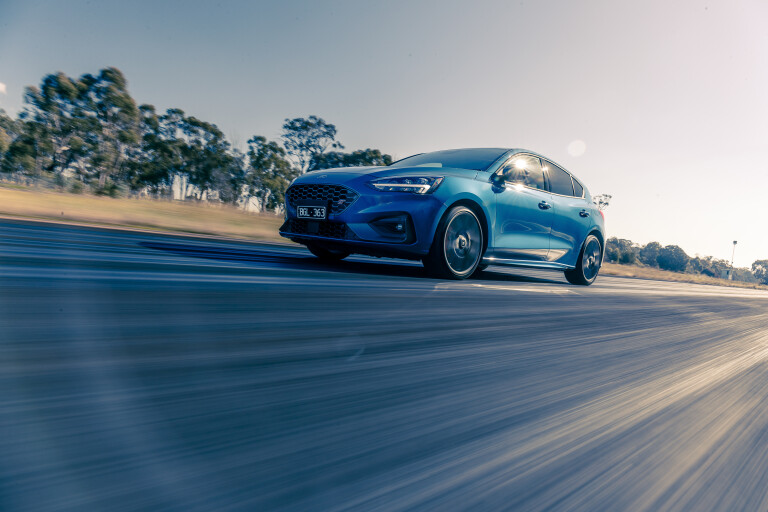
Things we like
- Torque monster
- Capable and engaging dynamics
- More mature and versatile than ever
Not so much
- Interior materials
- Pre-packaged drive modes
- 2021 update removes some features
The previous-generation Ford Focus ST earned many fans as an affordable champion of accessible performance, while the bigger, badder Focus RS held the mantle as the brand’s flagship performer.
But now, the Focus RS is no more, and the new Focus ST finds itself with even bigger shoes to fill while still maintaining its mature and democratic appeal without devolving into a white-knuckled racer.
Revealed in early 2019, atop Ford’s scaleable C2 architecture, the most focused er… Focus available came standard with a six-speed manual, but the inclusion of a no-cost optional seven-speed automatic seeks to give the sporty Focus a new level of mainstream appeal.
Of course the purists will always lust for the manual but it’s the seven-speed auto that most buyers will be selecting, and what we are sampling today. Does the self-shifting Focus ST have much to offer the keen driver? That’s what we’re here to find out.
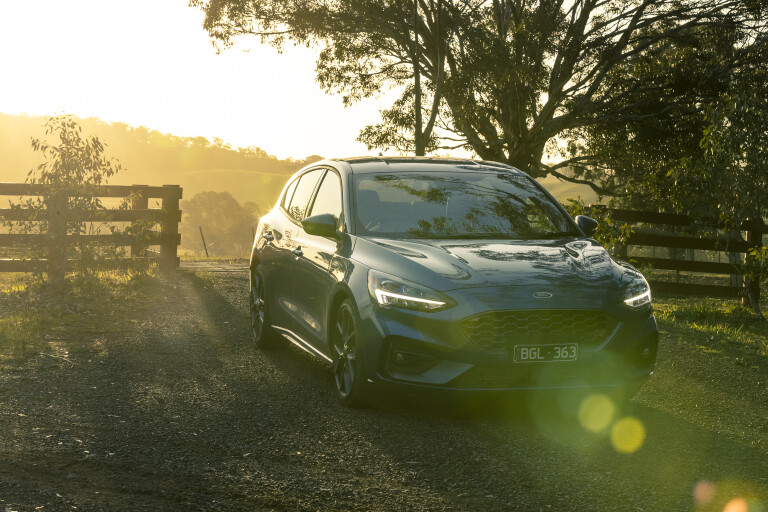
The centrepiece of the $44,890 (plus on-roads) Ford Focus ST is its turbocharged 2.3-litre four-cylinder motor lifted (and detuned) from the four-cylinder Mustang. It’s the big-block engine experience that proves the Ford’s point of difference from many others in the circa-$50k hot hatch realm.
Here, it produces 206kW and 420Nm; and while the peak power figure remains lineball with many of its 2.0-litre contemporaries, it’s the torque figure that makes the headlines with a 50Nm advantage over Volkswagen’s Golf GTI ($47,190) and a 42Nm advantage over the Hyundai i30N ($41,400). That’s also a healthy step up from the previous Mk3 Focus ST, which produced 188kW/366Nm.
Torque is the talking point of this package and is readily accessible down low, peaking between 3000 and 4000rpm, giving the Focus hatchback a whiff of muscle car about it as well as the ability to cover ground quickly and exploit overtaking opportunities in traffic.
It’s this versatile low- and mid-range where the Focus ST is best able to flex its muscles, as power delivery plateaus beyond 5500rpm.
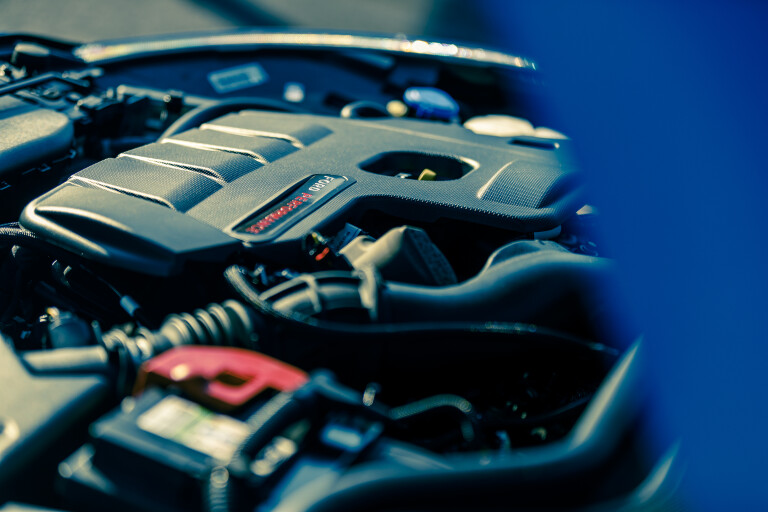
The conventional seven-speed torque converter’s logic is well-judged around town, although like many conventional autos it can be clunky in low-speed parking manoeuvres where quick switching between drive and reverse is needed. In the Focus, however, the automatic adds 26kg to the overall kerb weight and comes at the expense of the manual’s launch control software.
Manual-equipped Focus STs previously missed out on adaptive cruise control, which was only given to automatic examples initially. However, a minor packaging revision at the beginning of this year bestowed those manuals with the previously absent adaptive cruise, as well as adding stop-and-go capabilities to the automatic systems. Both transmission options also benefit from a 12.3-inch digital instrument cluster as standard.
Unfortunately, in keeping price adjustments to a minimum, the added digital instrument cluster comes at the expense of some previously standard-fit items such as heated front seats, blind-spot monitoring, rear cross-traffic alert and 10-speaker Bang & Olufsen premium sound system.
In the default Normal drive mode, the Focus – sitting on 19-inch alloys shod with 235/35/19 Michelin Pilot Sport 4S tyres – delivers a firm but very liveable ride around town. Providing a stark contrast to the smaller ‘always-on’ Fiesta ST, the independent rear suspension and larger footprint of the Focus lend an added level of refinement to its body control and overall composure on uneven roads.
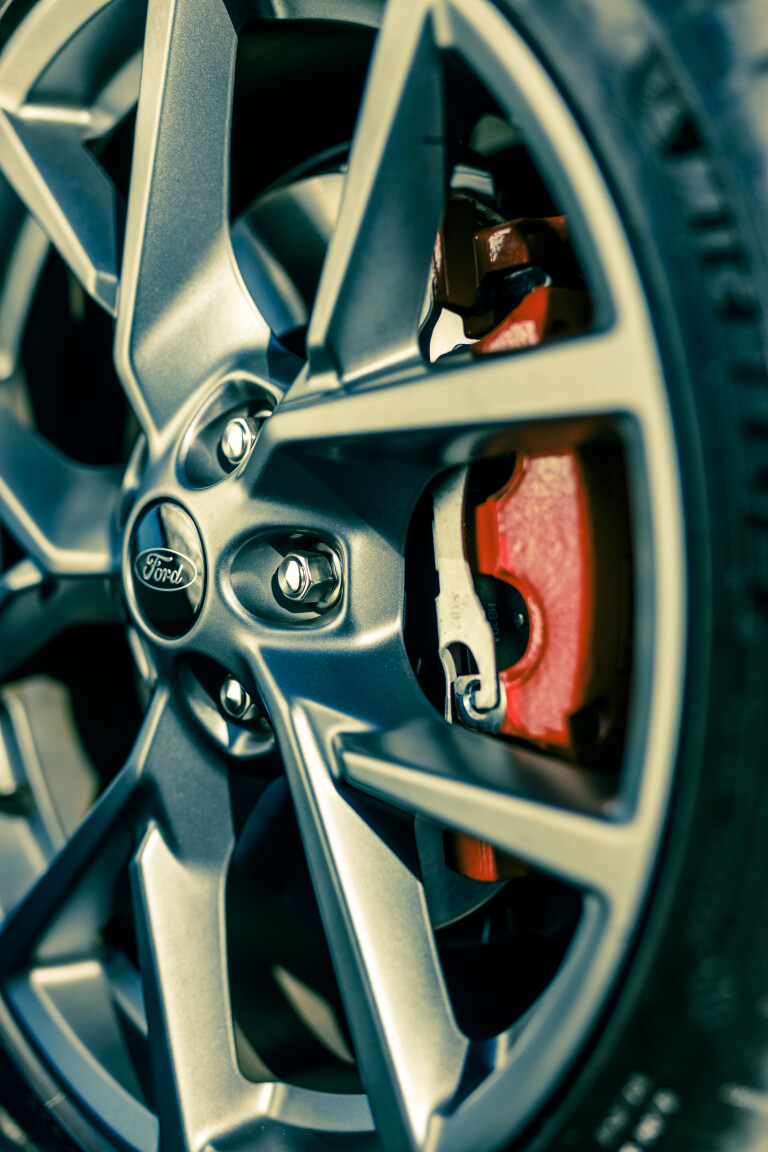
Three further drive modes – Slippery, Sport and Race – give the Focus ST wider breadths of talent, with Sport adding heft to the steering, firmness to the dampers and decibels to the synthesised engine audio. Race turns the wick up two-fold and damper settings here will likely be too much for a pockmarked Aussie backroad, so is best reserved for a circuit or the smoothest of road surfaces.
Unfortunately, Ford says the C2 architecture’s electrical systems don’t allow for independent adjustments between damping, steering and powertrain settings, instead remaining pre-packaged in their respective modes. So if you’d like your powertrain in Sport but your damping in Normal, you’re fresh out of luck.
So Sport mode it is, as we head out of town for a spirited Sunday morning drive.
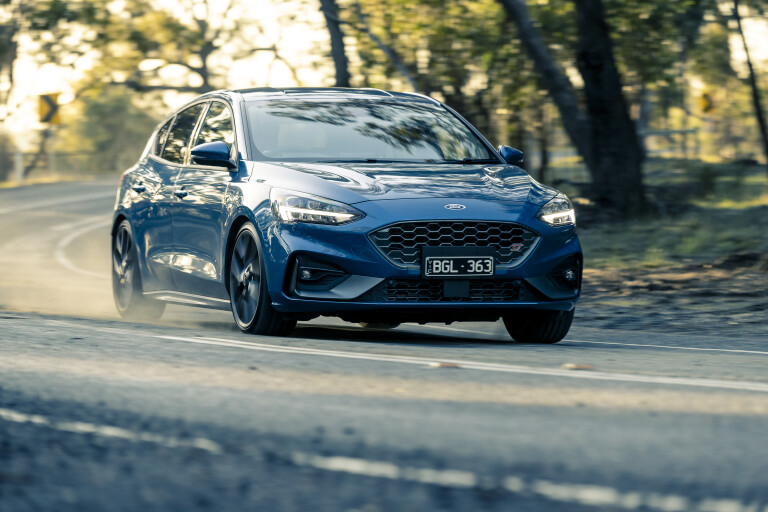
Although steering weight notches up noticeably in Sport, it doesn’t necessarily add feel or fidelity to the already wonderful and linear front end. As our drive continues, I begin probing the limits of the adhesion, incrementally approaching each corner with a little more aggression.
What I found was an incredibly unflappable front end, with its BorgWarner electronic differential yielding an incredibly high threshold of understeer. Once I’d keyed into the Focus’ character, I found I had to intentionally lob it into corners to force the front end to wash out. And when it did, it was very manageable and never ploughed.
You’ve got options too, as the Focus ST is very receptive to mid-corner adjustments, allowing you to adjust your line with braking or often by simply adding or subtracting more lock. The e-diff also allows you to power on much earlier than you initially think and while there is still kickback through the steering column, it’s not as dominant as is in its smaller ST-badged sibling. Overall, it’s a tremendously confidence-inspiring thing.
The Focus ST feels agile, as if it wants to rotate. It gives you that ‘pivot around the driver’ feeling and will even oversteer under sharp liftoff or mid-corner braking. Its brakes have a good and strong initial bite and I didn’t notice any fade on a hard run along Victoria’s Chum Creek Road. Curiously. What I did notice was some slight creaking from the front end of our test car.
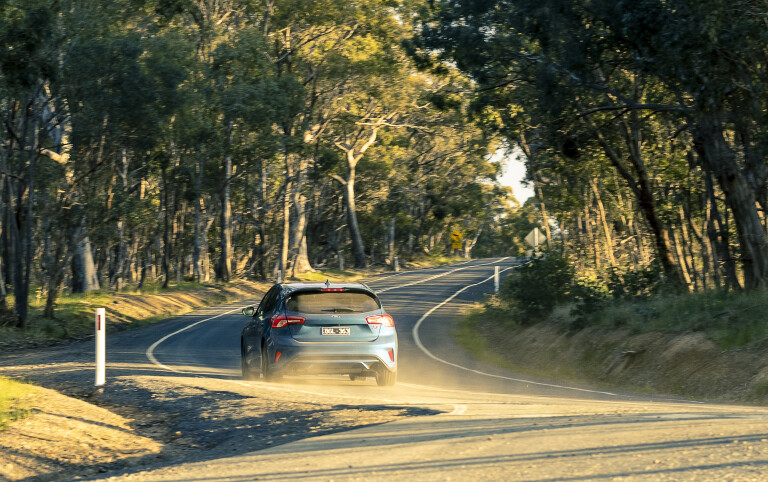
Taking the paddle shifts into your own hands works to great effect. Of course, a manual gearbox might be more engaging and fun, but the harsh reality is that most buyers will be opting for the torque converter example. The seven-speed auto may not be as telepathic as a dual-clutch, but is smooth and agreeable. Boatloads of useable low-end torque mean the Focus won't bog down on corner exit if you end up in a gear too high. Conversely, I found the seven-speed auto will give you the downshift if it can, even if the revs are sent zinging skyward.
As our proximity to Melbourne is signalled by increasing traffic and lowered speed limits, I ease back into the deeply scalloped Recaros and flick the drive mode back into Normal.
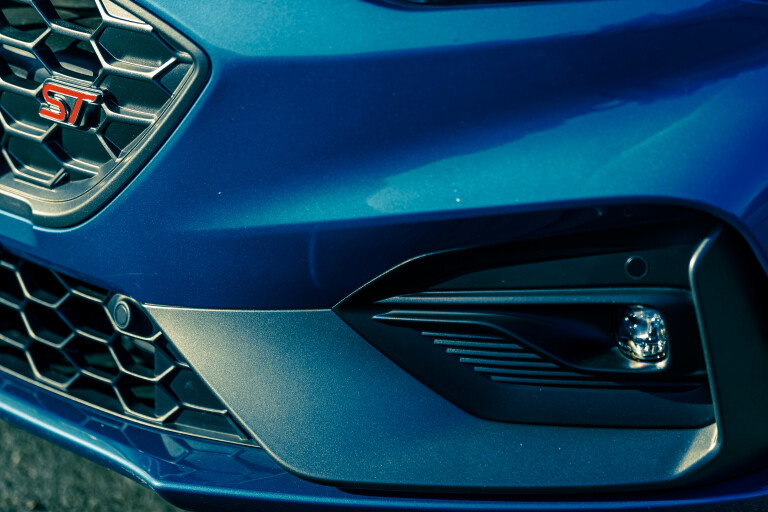
The cabin is a pleasant place to be, and comes well-equipped with an 8.0-inch central infotainment display, sat-nav, smartphone mirroring capabilities, dual-zone climate control and wireless phone charging.
Interior finishing and materials aren’t as polished as other competitors in this price bracket, but you get the sense that Ford has instead diverted its resources towards tech and dynamic equipment. The rear seats are a bit of a sore point, with no air vents and hard-touch plastics on the door cards. Ergonomics in this fourth-generation Focus, however, are a marked improvement over the preceding Mk3’s central stack button fest.
As the ST now assumes the top position in the Ford Performance Focus range, it’s grown both in performance and versatility. Hardcore enthusiasts continue to lament the loss of the potent RS but the Focus ST will now do more, better, for more people. Ford’s flagship Focus is more mature than ever but it hasn’t given up its fighting spirit. It’s here, that the Focus ST comes of age.

Things we like
- Torque monster
- Capable and engaging dynamics
- More mature and versatile than ever
Not so much
- Interior materials
- Pre-packaged drive modes
- 2021 update removes some features



COMMENTS